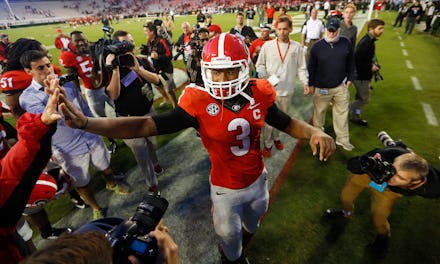One Tweet Perfectly Sums Up the NCAA's Hypocrisy Over Profits and Student Athletes

It doesn't take a lot to cross the line with the NCAA, apparently. Star University of Georgia running back and Heisman Trophy candidate Todd Gurley reportedly did so by cashing in on his autograph.
College football players, as nominal amateurs, are barred from profiting off their likenesses. Gurley allegedly charged between $8 and $25 for each signature, offering bulk rates to autograph dealers. UGA has suspended him indefinitely as the school investigates the charges.
Given that the NCAA charges for merchandise with star players' colors and numbers, ESPN analyst Jay Bilas called shenanigans.
Up to last year, the NCAA sold jerseys that had the same school and number as many superstar players. All people had to do was search the name of the athlete and these "generic" jerseys would appear on the site.
After pressure from Bilas and others, the NCAA decided to halt the sale of jerseys. Even NCAA president Mark Emmert recognized "why that could be seen as hypocritical." The thing is, the organization has built an empire on the athletic achievements of these individuals. It's nothing but hypocritical.
The NCAA is a cash cow that earns billions from television contracts for college basketball and college football. It's even reaped benefits from video games using the likenesses of players without compensating the student-athletes. The NCAA had to shut down that operation and settled a lawsuit for $20 million earlier this year. A judge later ruled the NCAA violated anti-trust laws by prohibiting athletes from getting paid for use of their "name, image and likeness."
As Fox Sports' Stewart Mandel notes, though, the ruling did not change the NCAA's policy regarding compensation for autographs.
The NCAA's business model provides an education to these athletes, even if that education is occasionally a sham, despite recruits who are occasionally not equipped to take advantage of it. In return, the NCAA, including their president, racks in the profits.
Even when athletes such as Gurley become huge figures in sports, they're barred from taking advantage financially. But as long as the school and the NCAA can profit from an individual's athletic talent, then no harm, no foul.
(h/t Sports Illustrated and FOX Sports)